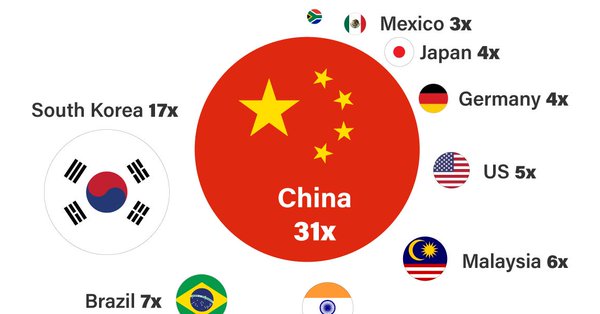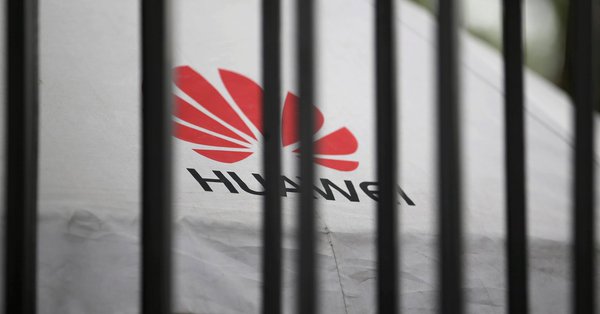Last week we quoted George Friedman of Geopolitical Futures saying the following on Bloomberg TV:
- “Xi was brought in to solve these problems. He can’t solve any of them; he didn’t manage Trump; he hasn’t made any progress in the South China sea; One Belt One Road initiative has kind of fallen apart; His most important job was handling his biggest customer and he has failed to do that; So in the Central Committee very quietly there is a discussion about what’s going to happen. Xi is nervous & that will wind up resulting in his going into Hong Kong”
What do autocrats do when they feel nervous about their position? They show they are powerful & not afraid to use their power. Look what Xi did on Friday morning. He not only raised tariffs on US goods coming into China but to quote what Ian Bremmer said on CNBC,
- “certainly the fact that President Xi made this announcement literally as Trump is traveling to the G-7 is kinda maximal embarrassment undermining the position of the US President saying No, we are not moving forwards towards more negotiations in a month; actually we are going to hit you preemptively before this meeting“.
Interestingly, just the day before Stratfor had published an article titled A Decisive Moment for China Draws Nigh. They pointed out that the meeting of China’s political leadership at Beidaihe had “reportedly just wrapped up.” What is Beidaihe & what was this meeting you ask? Stratfor explains:
- “For decades, the summer resort of Beidaihe, about 300 kilometers (186 miles) east of Beijing, has served as the site of numerous historical decisions — as well as a microcosm of factional struggles among China’s ruling elite.”
- “For decades, the rumored policy and personnel decisions made at the private gathering have closely intertwined with the country’s political path. Many of its key national strategies — including the Great Leap Forward, the hallmark economic and social campaigns of the Mao era — had their genesis at Beidaihe“
And we all know that Mao’s Great Leap Forward was a disaster for China. So the decisions taken at Beidaihe, especially the “fighting” decisions taken at Beidaihe can backfire. And, as Stratfor points out,
- “Beijing’s current position against Washington could very well set the tone for how the country will be perceived — and positioned …. And thus, the Chinese leadership will hesitate to let down its guard for fear of appearing weak against the United States.”
But, as the Chinese leadership also realizes, that
- “But with more U.S. tariffs set to take effect Sept. 1., and more trade pressures likely to follow, there’s also only so much more that the country’s already cooling economy can absorb before the repercussions start to generate greater domestic problems.”
On the other hand, in every autocratic system it is critically important for the current boss to appear strong & to get more confrontational as his position weakens. Is that why President Xi raised tariffs in a way that was designed to cause maximum embarrassment for President Trump? Or was that a slap against President Trump saying China knows how important stock market rally is to President Trump & China can destroy that rally any time they want?
How little do they understand President Trump? Yes, the Dow Jones Industrial Average did fall by over 600 points on Friday. Did President Trump express any concern? He dismissed it saying the Dow as 17990 when he was elected. It has gone up by 7000-8000 points because of him. So he doesn’t worry about a 600 point drop.
President Xi & China’s leaders have never run in a free election. So they don’t have a clue. Presenting President Trump with a China-US fight is probably the worst mistake they could make, Look what Ian Bremmer, Founder & President of Eurasia Group & no fan of President Trump, said on CNBC Closing Bell on Friday:
- “he [Trump] knows he is considered to be the standard bearer of harder line policy on China & there is a lot of bilateral support for that , from the national security committee, from the foreign policy establishment, from democrats & republicans across the aisle in Congress; you can imagine with someone over 1 year before the next election, that he says you know what – I am going to take the hit right now in the economy; I am actually all in on tariffs“
The really crucial part of Bremmer’s comments is the tremendous support in America from all sides to stop China from continuing its predatory policies. How bad have those policies been for the World? Look at the tweet below from Bremmer’s GZero Media:
- GZERO MediaVerified account @gzeromedia– Here’s how China’s growth over the past 40 years compares with that of half a dozen other economies.
These policies are not going to stop on their own. After all, they have worked for China for a long time & China is now critically dependent on them. So, as John Burbank of Passport Capital said recently on @realvision ,
- … this is as big a thing as there exists … We’ve never lived through a fracturing of the world, I guess, since World War II. … Trump brought this from his base, but now there is bipartisan agreement essentially that the US has to partition China to limit China’s power and ambitions.
And this past Friday, to use a phrase of John Burbank, “is a tipping point of recognition now“. And what is the tip of this spear?
- GZERO MediaVerified account @gzeromedia– If the U.S. ban stays in place, today’s Huawei won’t survive.
What is the conclusion of the gzero article?
- “And so Huawei is probably going down. As that fact becomes clearer over the coming days and weeks, it will send shockwaves through both the $1 trillion global telecoms sector and through geopolitics. Don’t say we didn’t warn you.”
But President Xi has opened the ball & he cannot afford to back down. What did Ian Bremmer say about that on Friday?
- ” …So will the Chinese move beyond tariffs & start looking at direct hits to access of American corporations in China? For example, is Apple going to be doing business in China over the next 3-6 months the same way they are doing right now? … plenty of non-tariff means to hit back at US & I suspect in the near term they are going to …”
More importantly, President Trump warned US companies in more direct terms on Friday:
- Donald J. TrumpVerified account @realDonaldTrump– Our Country has lost, stupidly, Trillions of Dollars with China over many years. They have stolen our Intellectual Property at a rate of Hundreds of Billions of Dollars a year, & they want to continue. I won’t let that happen! We don’t need China and, frankly, would be far….
- Donald J. TrumpVerified account @realDonaldTrump–….better off without them. The vast amounts of money made and stolen by China from the United States, year after year, for decades, will and must STOP. Our great American companies are hereby ordered to immediately start looking for an alternative to China, including bringing..
- Donald J. TrumpVerified account @realDonaldTrump – …your companies HOME and making your products in the USA. I will be responding to China’s Tariffs this afternoon. This is a GREAT opportunity for the United States. Also, I am ordering all carriers, including Fed Ex, Amazon, UPS and the Post Office, to SEARCH FOR & REFUSE,.
-
Donald J. TrumpVerified account @realDonaldTrump –….all deliveries of Fentanyl from China (or anywhere else!). Fentanyl kills 100,000 Americans a year. President Xi said this would stop – it didn’t. Our Economy, because of our gains in the last 2 1/2 years, is MUCH larger than that of China. We will keep it that way!
Frankly, this fight with China, a fight that was declared by President Xi on Friday morning, is neither bad for President Trump nor does it come at an inconvenient time? As Ian Bremmer, no fan of President Trump, tweeted this morning:
- ian bremmerVerified account @ianbremmer – Timing of Trump’s China fight isn’t bad. US companies increasingly unhappy w China trade/IP practices. US economy strong. China economy softening. Chinese labor less relevant to US manufacturing. But you need allies. And Trump is fighting China and the G7 at the same time.
We have maintained for months that this US-China fight is similar, if not almost a replica, of the US-Japan fight in the 1930s-1940s. That fight cost America a lot of money & a period of weak economic growth. But was that worth the enormous multi-decade victory over that Imperial Japan? There is hardly anyone who would say No to that today.
But what about Hong Kong? Stratfor wrote in their article on Tuesday:
- “Meanwhile, China’s economic slowdown is propelling its leaders to diversify trade routes and develop new financial footholds in more remote regions of the world. … This could increase the likelihood of Beijing intervening in Hong Kong’s political crisis, should the situation continue to escalate before the national day in October. But in the longer term, it also means that Beijing will likely further tighten its already heavy security and surveillance regimes along its Western periphery … to pursue a more ruthless and discriminatory approach … , including the establishment of re-education camps.”
Wouldn’t any of that push the G7 to the US side against China? And what about China’s increased military pressure on smaller Asean countries in the South China Sea? If the world is going to be fractured, wouldn’t China want to get the South China Sea & the near Pacific in to its side? Come to think of it, isn’t that what Japan did back in late 1930s & early 1940s?
No wonder Ian Bremmer closed his CNBC Closing Bell appearance with,
- “ I really do think the next few months have the potential to be pretty severe“
Send your feedback to [email protected] Or @MacroViewpoints on Twitter

